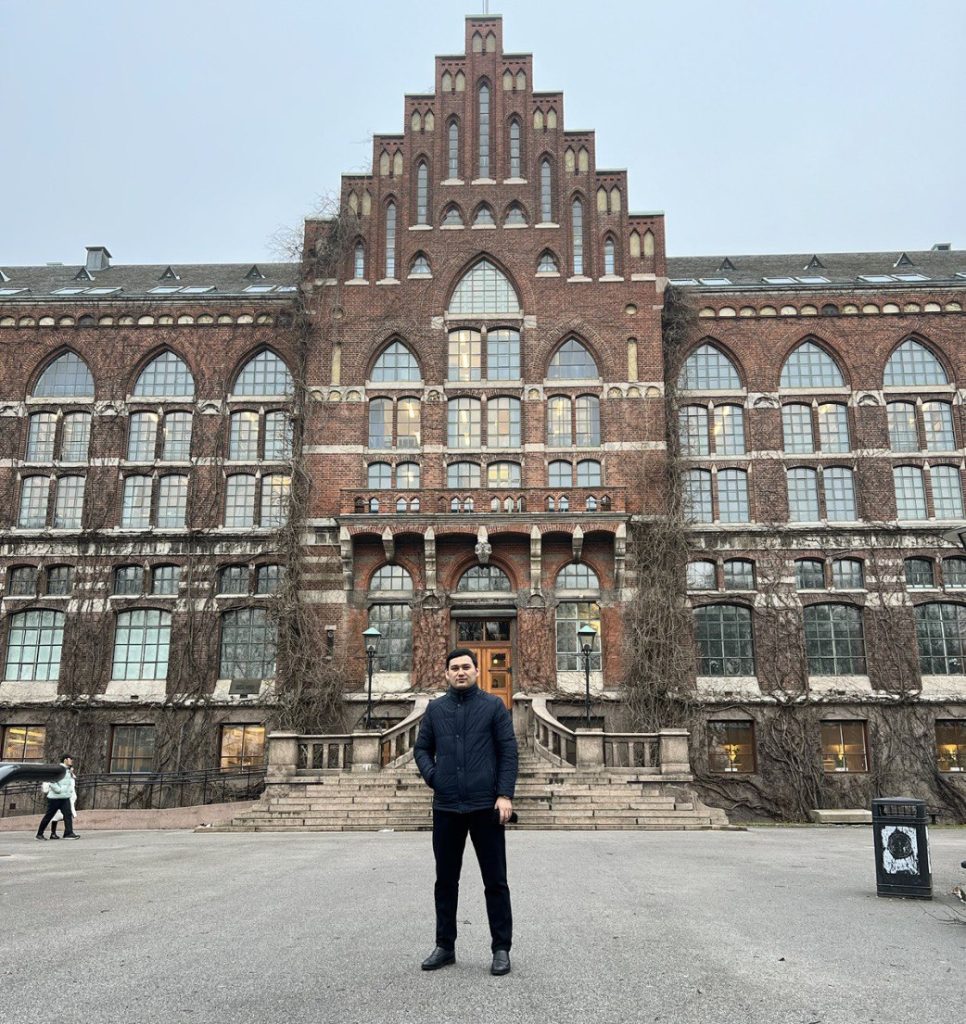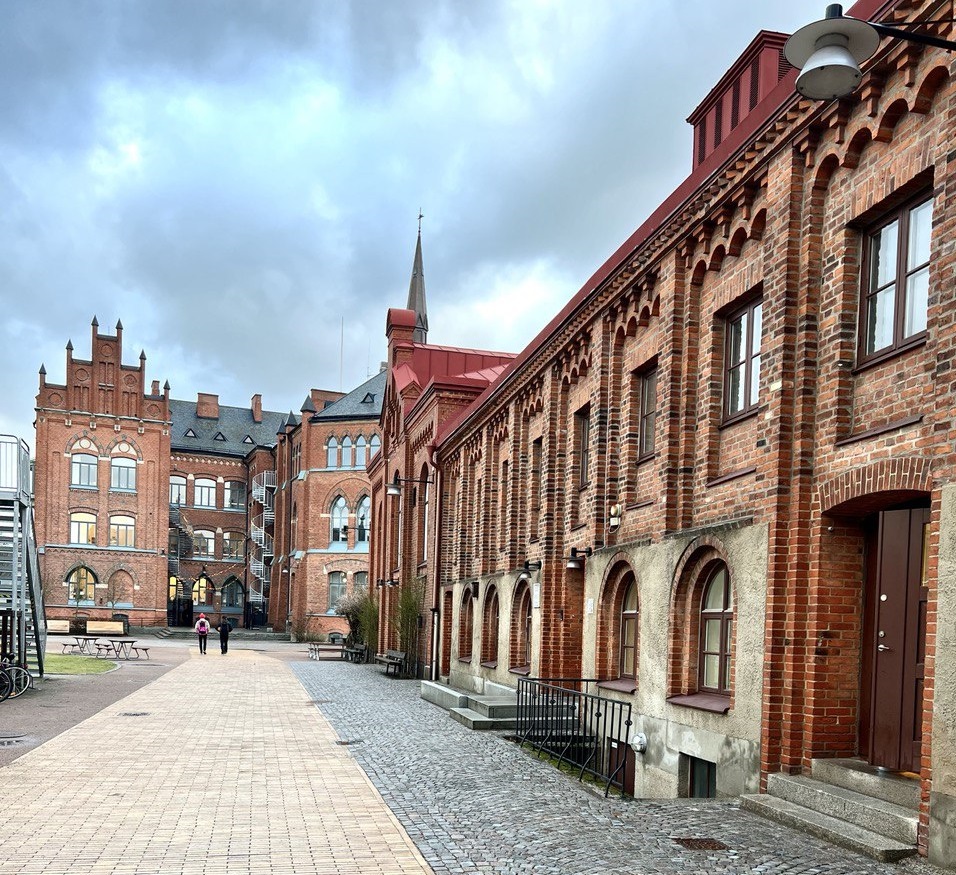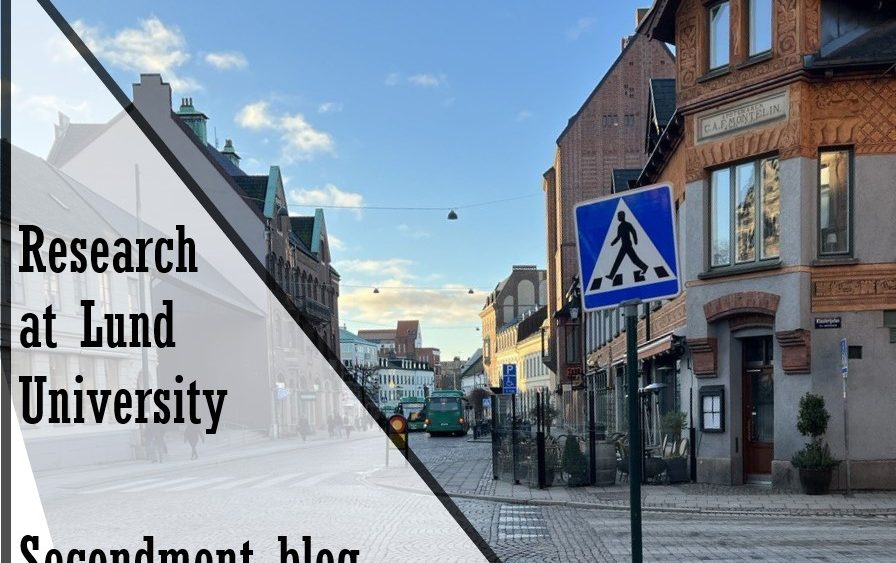by Diyorbek Ibragimov, guest researcher from the Law Enforcement Academy of Uzbekistan
About me
Welcome to my blog post about the secondment experience at Lund University in Sweden! My name is Diyorbek Ibragimov and I am a guest researcher at Lund University. My secondment started on the 1st of February. In this blog post, I would like to talk about my experience in Sweden, certain aspects of Swedish culture, also the research environment at Lund University, as well as about my project.
It is essential to mention that, Lund University is highly ranked in many international comparisons of higher education institutions. The University has been consistently placed in the global top 100 in different university rankings. Therefore, it gave me great pleasure to conduct research at this university.
Lund University made an impression on me as a wonderful real science institution that provides equal opportunities for students, university staff, and visiting researchers like us. As soon as I started my research work, I attended a seminar discussion of Marie Leth-Espensen’s research on the topic of “Animals and the politics of suffering” and Heraclitos Muhire’s research on the topic of “Revolving doors to the private sector? A socio-legal study on top state and region officials’ transitions to the private sector and their regulation adults”. And, they gave me a wonderful opportunity to enrich my scientific skills and experience.

About my research work
Currently, corruption is one of the painful problems not only in Central Asian countries but also in the whole world. It should be noted that corruption has negative effects on the economic, social, and political development of the country. So, “corruption, primarily affecting weak states in Eastern Europe, Africa, Asia, and Latin America, is the main cause of poverty and inequality” (Urinboyev, Mustafoev, 2023). This can be justified by several approaches. One of the most important of them is in countries with a lower economic index, the standard of living of the population will be also lower. As a result of this, these reasons create conditions for evolving situations such as attempts to improve living conditions and gain wealth by the population, especially officials, through corruption.
By the way, the construction industry has become one of the biggest businesses. The increasing of population in the world is causing for a growing need for construction. Studies show it has predicted that global construction output will increase by more than 70%, to US $15 trillion per year worldwide, by 2025. Some of those countries where the highest growth is predicted are also perceived as having the highest levels of corruption (K&L Gates, 2014). In turn, it should be noted that corruption risks are also increasing in this field.
On the other hand, it has been proven that сorruption in the construction sector can directly threaten human life, as can be seen in the examples of disasters in Turkey and Syria. On the night of 5 February, a severe earthquake occurred in southern Turkey on the border with Syria. Twelve days after a devastating earthquake hit Turkey and Syria, more than 46,000 people have died and more than 84,000 buildings have either been severely damaged, need urgent demolition, or collapsed, according to officials. What attracted my attention was that the city of Erzin, which is situated 80-100 km away from the major earthquake-damaged cities in Turkey, was not damaged by the earthquake (Aljazeera, 2023). No major damage, and no deaths, because, reportedly, they have always been strict to enforce construction quality standards.
Who can guarantee that such natural disasters will not happen again in every part of the world? Therefore, the prevention of corruption in the construction industries, and the implementation of construction works based on the established standards is one of the main priority tasks today. One of the most important signs of preventing corruption in the construction industry is the identification and assessment of corruption risks. In particular, Charles Louis Montesquieu said in his philosophical legal work “On the Spirit of Laws” (1748), “… the intelligent legislator is not concerned about the punishment of crime, but about the prevention of crimes”.
In general, in Uzbekistan, several measures are being implemented to prevent corruption, identification, and assessment of corruption risks not only in the construction sector but also in other areas. As presented above, the role of construction in the life of the country has become significant, in particular, as of January 1, 2021, as the number of enterprises and organizations in the construction sector has reached 41,000, which has increased by 1.7 times or 17,100 units compared to 2017 (Stat.uz, 2021). All this imposes an obligation to make this industry an area free from corruption, building facilities that can meet the standards for the future.
It should be noted that in Uzbekistan, as in other CIS member states, existing social relations are regulated by adopting and applying normative legal documents. In particular, the Law “On Combating Corruption” was adopted, which defines the main directions of the state policy in the field of combating corruption, the state bodies that directly carry out anti-corruption activities, and their duties and functions. In addition, the Decision of the President of the Republic of Uzbekistan “On measures to improve mechanisms to remove corruption risks in the field of public administration and expand public participation in this sphere” was adopted in order to identify corruption risks and eliminate them. Most importantly, in order to prevent corruption risks in the construction industry, the “Transparent Construction” information system was launched, which includes the development of an architectural-planning task, the examination of project-estimate documents, construction control, in a word, the processes from beginning to the end of construction. The main purpose is to prevent corruption in this field, as well as to reduce the human factor as much as possible. The most important point is that this system is directly integrated into the prosecutor’s office, and it gives an opportunity to the prosecutor’s office for effective prosecutorial supervision over the execution of legislation in this field.
The institutional and legal framework for anti-corruption reviews has been established in Uzbekistan, but the existing potential is not being used as effectively as it could be (Urinboev, 2020).
Despite the implementation of a number of measures to prevent corruption, identification, and assessment of corruption risks in Uzbekistan, the country’s place in international rankings and indexes remains behind. This means that there are still drawbacks in implementing the actual content of normative legal documents aimed at preventing corruption. That is, the development of legal documents aimed at identifying and preventing corruption risks in the construction sector does not mean that corruption problems in this sector have been eliminated.
During my guest research stay, I will try to study this topic and provide an analysis of existing problems and shortcomings in the identification, assessment, and prevention of corruption risks in the construction sector, as well as opportunities for their elimination.

Building culture in Lund
In general, in Lund, special attention is paid to urban planning, the construction industry, and the fact that the buildings show the bright beauty of the 18th century and it attracts a person. It is obvious that every building was built with high quality. Therefore, in Sweden, specifically in Lund, I am deeply interested in studying the construction culture, the mechanism of implementation of the processes related to it, and getting acquainted with the work carried out in this regard to identify and evaluate corruption risks. I will share my learnings and impressions on this subject in future analyses, articles, and blogs.
REFERENCES
1. Aljazeera, 2023. Earthquake death toll surpasses 46,000 in Syria, Turkey. https://ww.
aljazeera.com/news/2023/2/18/earthquake-death-toll-surpasses-46000-in-syria-turkey.
3. K&L Gates, 2014. Biggest Risk of Corruption in The Construction Industry. The Global Picture.
2. Stat.uz, 2021. Information on the demographics of the activities of enterprises and organizations in the Republic of Uzbekistan. https://stat.uz/images/uploads/reliz2021/presreliz_101122_uzb_compressed.pdf
4. Urinboyev R, Mustafoev T., 2023. Law, society, and corruption: exploring (Anti-) corruption from interdisciplinary and multilevel perspectives. Research report / Coursebook in Sociology of law 2023:1, 7.
5. Urinboev R, 2020. Central Asian law: legal cultures, governance, and business environment in Central Asia. A collection of papers from Central Asian guest researchers seconded to Lund university, 79.

